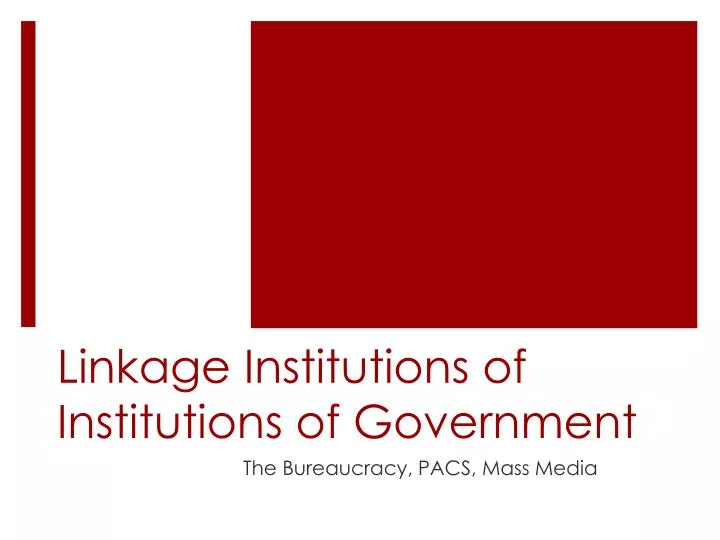What is a Linkage Institution? Explained Simply.

In the world of politics and governance, linkage institutions play a crucial role in connecting citizens with the government. These institutions act as bridges, facilitating communication and participation between the public and the decision-making processes. Understanding what a linkage institution is and how it functions is essential for anyone interested in political science, civic engagement, or simply how societies organize themselves. This post will break down the concept of linkage institutions, their types, and their significance in modern democracies, all while keeping it simple and informative. (linkage institutions, political science, civic engagement)
What is a Linkage Institution?

A linkage institution is an organization or structure that connects individuals and groups to the political system. These institutions help citizens influence government policies, express their opinions, and participate in the democratic process. They are essential for maintaining a healthy and responsive political system.
Key Functions of Linkage Institutions
- Facilitating Communication: They provide channels for citizens to voice their concerns and ideas to the government.
- Encouraging Participation: They motivate people to engage in political activities like voting, protesting, or joining interest groups.
- Shaping Public Opinion: They play a role in informing and educating the public about political issues.
💡 Note: Linkage institutions are not part of the government but act as intermediaries between the people and the state.
Types of Linkage Institutions

Linkage institutions can be categorized into several types, each serving a unique purpose in the political landscape.
1. Political Parties
Political parties are among the most prominent linkage institutions. They organize citizens with similar ideologies, nominate candidates for public office, and mobilize voters during elections. (political parties, elections, democracy)
2. Interest Groups
Interest groups represent specific causes or sectors of society. They lobby the government to influence policies that align with their members’ interests. Examples include labor unions, environmental organizations, and business associations. (interest groups, lobbying, advocacy)
3. Media
The media acts as a vital linkage institution by informing the public about political events, government actions, and societal issues. It also serves as a platform for public debate and scrutiny of those in power. (media, journalism, public opinion)
4. Religious and Community Organizations
These groups often mobilize their members around political issues, fostering civic engagement and collective action. They can also provide a moral or ethical framework for political participation. (religious organizations, community engagement, activism)
| Type of Linkage Institution | Primary Function | Example |
|---|---|---|
| Political Parties | Mobilize voters and nominate candidates | Democratic Party, Republican Party |
| Interest Groups | Lobby for specific policies | National Rifle Association (NRA) |
| Media | Inform and shape public opinion | CNN, The New York Times |
| Religious Organizations | Mobilize members around political issues | Southern Baptist Convention |

Why Are Linkage Institutions Important?

Linkage institutions are critical for the functioning of democratic societies. They ensure that the government remains accountable to the people and that citizens have avenues to influence policy-making. Without these institutions, the gap between the government and the governed would widen, leading to disengagement and dissatisfaction.
Benefits of Linkage Institutions
- Enhanced Democracy: They promote inclusivity and representation in the political process.
- Accountability: They hold government officials accountable by scrutinizing their actions.
- Civic Education: They educate citizens about their rights and responsibilities.
📌 Note: Strong linkage institutions are a hallmark of a robust and participatory democracy.
How to Engage with Linkage Institutions

If you’re looking to get involved in the political process, here’s a checklist to guide you:
- Join a Political Party: Find one that aligns with your values and participate in their activities.
- Support Interest Groups: Contribute to or volunteer with organizations that advocate for causes you care about.
- Stay Informed: Follow reputable media outlets to stay updated on political developments.
- Participate Locally: Engage with community and religious organizations to make an impact at the grassroots level.
(civic engagement, political participation, grassroots activism)
Wrapping Up

Linkage institutions are the backbone of democratic participation, ensuring that citizens have a voice in governance. Whether through political parties, interest groups, media, or community organizations, these institutions provide the tools and platforms needed for effective civic engagement. By understanding and engaging with them, individuals can contribute to a more responsive and accountable political system.
What is the main purpose of a linkage institution?
+
The main purpose of a linkage institution is to connect citizens with the government, facilitating communication, participation, and influence in the political process.
How do political parties function as linkage institutions?
+
Political parties organize citizens with similar ideologies, nominate candidates for public office, and mobilize voters during elections, acting as a bridge between the people and the government.
Can media be considered a linkage institution?
+
Yes, the media is a vital linkage institution as it informs the public about political events, facilitates public debate, and holds those in power accountable.



